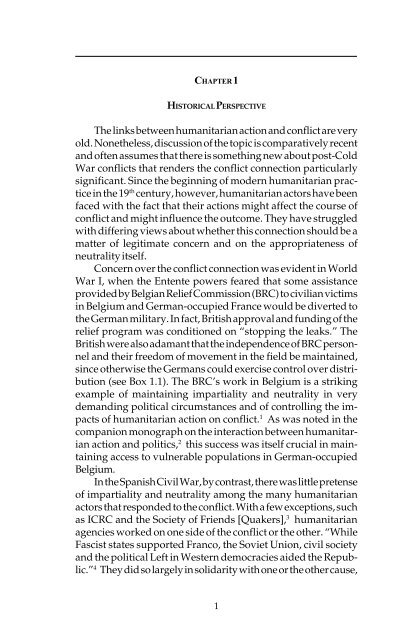Brown Cover OP 43 - The Watson Institute for International Studies
Brown Cover OP 43 - The Watson Institute for International Studies
Brown Cover OP 43 - The Watson Institute for International Studies
You also want an ePaper? Increase the reach of your titles
YUMPU automatically turns print PDFs into web optimized ePapers that Google loves.
CHAPTER 1<br />
HISTORICAL PERSPECTIVE<br />
<strong>The</strong> links between humanitarian action and conflict are very<br />
old. Nonetheless, discussion of the topic is comparatively recent<br />
and often assumes that there is something new about post-Cold<br />
War conflicts that renders the conflict connection particularly<br />
significant. Since the beginning of modern humanitarian practice<br />
in the 19 th century, however, humanitarian actors have been<br />
faced with the fact that their actions might affect the course of<br />
conflict and might influence the outcome. <strong>The</strong>y have struggled<br />
with differing views about whether this connection should be a<br />
matter of legitimate concern and on the appropriateness of<br />
neutrality itself.<br />
Concern over the conflict connection was evident in World<br />
War I, when the Entente powers feared that some assistance<br />
provided by Belgian Relief Commission (BRC) to civilian victims<br />
in Belgium and German-occupied France would be diverted to<br />
the German military. In fact, British approval and funding of the<br />
relief program was conditioned on “stopping the leaks.” <strong>The</strong><br />
British were also adamant that the independence of BRC personnel<br />
and their freedom of movement in the field be maintained,<br />
since otherwise the Germans could exercise control over distribution<br />
(see Box 1.1). <strong>The</strong> BRC’s work in Belgium is a striking<br />
example of maintaining impartiality and neutrality in very<br />
demanding political circumstances and of controlling the impacts<br />
of humanitarian action on conflict. 1 As was noted in the<br />
companion monograph on the interaction between humanitarian<br />
action and politics, 2 this success was itself crucial in maintaining<br />
access to vulnerable populations in German-occupied<br />
Belgium.<br />
In the Spanish Civil War, by contrast, there was little pretense<br />
of impartiality and neutrality among the many humanitarian<br />
actors that responded to the conflict. With a few exceptions, such<br />
as ICRC and the Society of Friends [Quakers], 3 humanitarian<br />
agencies worked on one side of the conflict or the other. “While<br />
Fascist states supported Franco, the Soviet Union, civil society<br />
and the political Left in Western democracies aided the Republic.”<br />
4 <strong>The</strong>y did so largely in solidarity with one or the other cause,<br />
1

















